|
Great Adventure
A Total Entertainment Park
Created by Warner LeRoy
A Hardwicke Company
CONCEPT
GREAT ADVENTURE is a total entertainment
park set on 1500 magnificent acres in New Jersey , within one hour of
New York City , Philadelphia , and the New Jersey coast. The
park will consist of seven major areas plus related facilities.
They are:
1. The Enchanted Forest
. A theme amusement park with spectacular and fantastic rides,
restaurants, theatres, exhibits and live entertainment set amidst
beautiful oak forests and lakes.
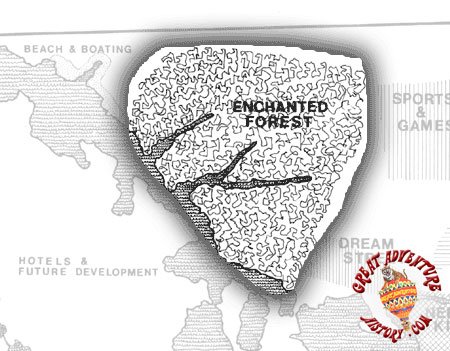
2. Safari.
The world’s largest drive-through safari park outside of Africa, with
more than ten miles of road, inhabited by large herds lions, tigers,
cheetah, rhinoceri, elephants, giraffe, zebra, antelope, bears, baboons,
gorillas and other animals.
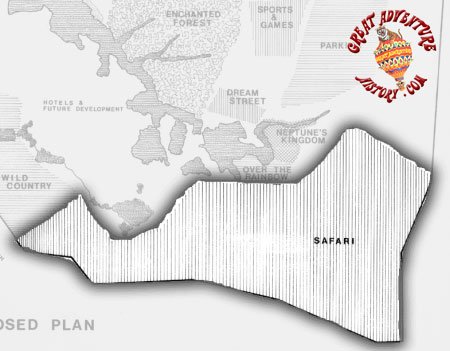
3. Neptune’s Kingdom.
A lakeside amusement area with shows and exhibits of killer whales,
dolphins, penguins, alligators, sea lions and creatures of the sea;
water rides underwater fantasy ride, water ski show, and boat safari
with fish, animals , birds and surprises in the water and on the shore;
restaurants, ancient frigates, and performing log rollers, high divers,
kite flyers and others.
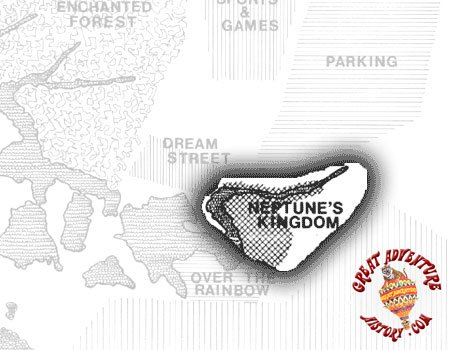
4. Dream Street
. An incredible fantasy shopping street and squares, with
more than fifty different store, markets and bazaars, performers and
entertainment, craftsmen and craft exhibits, workshops, fountains and
restaurants.

5. Over the Rainbow.
A lush pastoral area with picnic grounds, touchable animals and
exhibits, miniature city, antique car rides, waterfront restaurants,
children’s playground, carousels and boat rides.

6. Sports and Games.
A sports plaza with an Olympic ice rink, roller rink, Olympic swimming
pool and an arena to house sports activities and shows, historical
pageants and circuses.
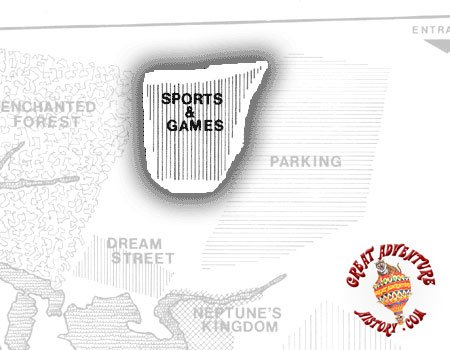
7. Wild Country.
Camp sites in the wilderness with stables, riding trails, trading posts,
tree houses, and many outdoor facilities for sports and recreation.

RELATED FACILITIES
1.
A large beach,
swimming and boating area along more than two miles of lake.
2.
Hotels and
living accommodations, with all manner of sports, health and
entertainment facilities.
PARK
TRANSPORTATION
All areas of the park except for Safari will be linked by intra-park
transportation which will consist of trams, cable cars, cable rides,
trains, boats and, when the hotels are completed, a monorail.
The visitor will arrive at a parking lot from whence the intra-park
transportation facilities will be available to him. He will
drive his own car through Safari.
THE LAND
The land was purchased from a gentleman who has lived there for more
than forty years. Except for his house and a few small
buildings, the land is untouched. It is extraordinarily
beautiful, and is one of the only large tracts of country land within a
close range of New York City . There are forests of oak,
maple, beech and elm. Water flows throughout the land, with
eleven lakes currently existing on now. The water has the
highest rating for purity in the State of New Jersey . The
contour of the land is gently rolling. Directly to the south
is a large state park and local game preserve.
LOCATION
The property is located
within a reasonable driving distance of the largest resident population
in the Western Hemisphere . Approximately 28 million people
live within an hour and fifteen minutes of the park.
In addition, more than 20 million visitors a year visit the New York and
Philadelphia metropolitan areas. Within a 3-hour drive live
an additional 10 million people. Access to the
property is direct and simple. The park is located directly
off Interstate Highway #195, a major freeway. When it is
completed, #195 will be the only major highway between New York and
Philadelphia , linking the New Jersey Turnpike and the Garden State
Parkway . The portion from the New Jersey Turnpike to the
park will be completed in 1973. The portion from the park to
the Garden State Parkway will be completed in 1975.
GREAT ADVENTURE AND THE ENTERTAINMENT PARK INDUSTRY
The entertainment
park is the fastest growing segment of the American
entertainment-leisure time industry. In 1972
more than 200 million people attended entertainment parks.
There are many reasons for this. Among them are: Americans’
increasing interests in the environment and the outdoors; the need for
temporary escape from the congestion and difficulties of city living;
increased lengthier periods of leisure time such as 3 and 4 day week
ends; the re-discovery of the joys of involvement as opposed to the
passivity of television and film.
The entertainment park offers a dazzling array of spectacle, excitement,
beauty and variety which no other entertainment can approach.
There is something for everyone, and families can partake of pleasures
together in an atmosphere of leisure, fun and nature. Parks
may be visited a few hours or a few days, and some parks have facilities
and entertainments to keep the visitor busy for at least a week.
The average daily expenditure in the major entertainment parks, not
including living accommodations, but including all entertainment, food
and purchases of souvenirs and gifts is approximately $8.50.
A separate report
examines the economic potentials of Great Adventure.
However, we note that the most successful entertainment park in the
world today is Disney World in Florida , which had over 10 million
visitors last year. The last entertainment park in the
New York area, which was small and old fashioned, was Palisades
Amusement Park , and it had more visitors in three months that Disney
World has in an entire year.
|


Map showing proximity of the population to the park's location
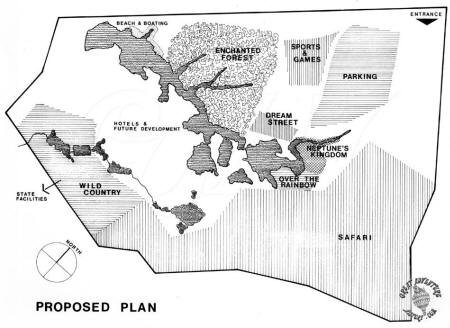
The proposed areas of development. Interestingly, only the
Safari was built more or less in it's original location, though it was
slated to be much larger than was built.
Notes:
Original plans for the park were quite spectacular, with The
Enchanted Forest, Dream Street, Neptune's Kingdom,
and Over The Rainbow all slated to be separate themed areas and
more or less parks unto themselves. When the park was built the
elements of all those areas were combined into "The Enchanted Forest"
which became the theme park we all know today. Dream Street
became the park's central thoroughfare, and Neptune's Kingdom
was the name given to the area surrounding the Aqua Stadium. Elements
of Over The Rainbow became the Garden of Marvels area.
The overall concept of the park with
resorts and parks linked by transportation systems, and the parking area
being separated from the parks was definitely influenced by the design
of Walt Disney World which had just opened about the time these plans
were being created.

Aerial view of the property before construction began
Pictures of the
virgin property

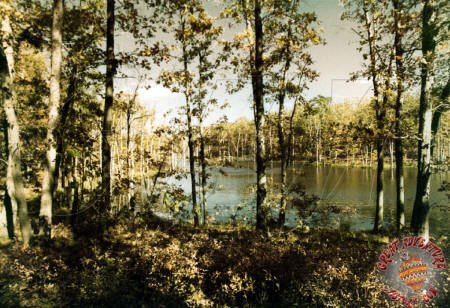
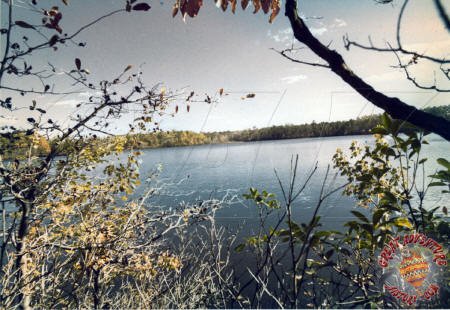
Notes:
The greatest asset of
Great Adventure always has been the natural beauty of the location.
When the park was developed special care was taken to preserve and
highlight that natural beauty.
An interesting note is that
Interstate 195 didn't connect to the Parkway until 1981.
The
early 1970's were a boom
time for theme park development, with dozens of parks being proposed and
built all around the country. Many of the major theme parks
which still thrive today were built in this time frame, including most
of the parks that now make up the Six Flags chain.
As the baby boomers began to have children (Generation X) and with the
expansion of the Interstate Highway System, families were traveling to
parks and spending money, looking for new diversions.
The estimate given of per capita spending of $8.50 is about $38.75 in
today's dollars, which is approximately the per capita spending rate at
the park today according to recent Six Flags investor information.
|
TIMETABLE |
|
Opening: April 1974
|
The complete
Safari plus approximately one-quarter of the Enchanted Forest , Dream
Street , Neptune’s Kingdom and Over the Rainbow. |
|
Opening: April 1975 |
Completion of
three-quarters of The Enchanted Forest, Dream Street , Neptune’s
Kingdom and Over the Rainbow. Opening one third of Wild
Country, Sports and Games and the Beach and Recreational facilities. |
|
Opening: April 1976 |
Completion of
the Enchanted Forest , Dream Street , Neptune’s Kingdom, Over the
Rainbow and Wild Country. Completion of two-thirds of
Sports and Games and Beach and Recreational Facilities.
Completion of the first two major hotels and facilities.
|
|
Opening: April 1977 |
Completion of
Beach and Recreational Facilities. Completion of two major hotels. |
|
Opening: April 1978 |
Additional
hotels. Completion of Sports and Games. |
|
|



